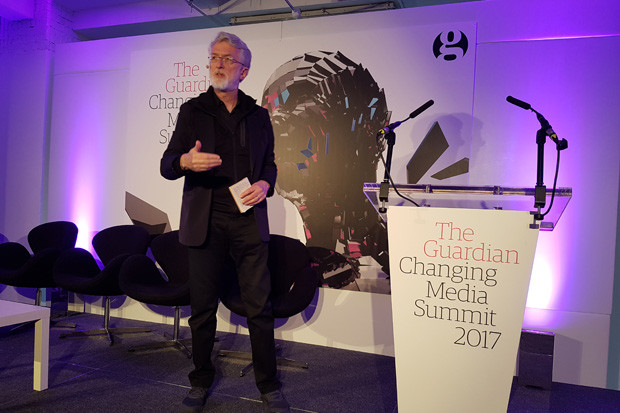"In fake news, there are many affected and responsible parties," said Jeff Jarvis, professor and director of the Tow-Knight Center for Entrepreneurial Journalism at CUNY's Graduate School of Journalism.
Speaking at the Guardian Media Changing Summit today (15 March), he explained how publishers, platforms, advertisers, the public relations industry and the audience itself can work together and develop individually to tackle the misinformation ecosystem.
Publishers
"The goal of journalism is not to produce and manufacture content, it's not to get an audience, attention or engagement – it is to inform the public conversation," Jarvis added, referencing New York University professor Jay Rosen, who said that public opinion should not be formed by the press, but should be expressed in public and recorded in the media.
"Look at the American election – journalism was all about predicting the outcome. Predicting outcomes does not inform the public, it merely makes the journalists look savvy, but the truth is, of course, we could not predict sunset."
When publishers use the research tools and opportunities available to them to look into the public conversation, Jarvis said, the media will be able to better serve audiences with the information they want and need to know, and develop an understanding of how readers lose and build trust in news organisations.
"We need to look at educating ourselves in empathy, and learn how to listen," he said, noting that unless media organisations understand and reflect different world views, they can not relate to their readers or inform them adequately.
"We have to listen to communities, understand their goals and needs, and only then bring them journalism. Give up the notion that we are always the destination, the finished product called 'journalism and content' – we need to take journalism to the conversation when and where it occurs, be it Facebook, YouTube or Twitter, in the appropriate context for the platform."
Advertisers
Jarvis explained the advertising industry has to "cut off the air supply" to fake news, and understand signals of distrust to learn that they don't want their brand associated with inappropriate content.
"They have got to understand that quality matters," he said, adding that advertisers have to reinvent their industry to move past reach to relationships, to know and serve the needs of their audiences, "as opposed to a mass we are just blasting messages to".
"We, outside the advertising industry, have to create pressure on the industry to say 'stop advertising on this crap, this dangerous stuff' – I don't want to see blacklists, but I do want to see responsibility from the advertisers."
Platforms
"Platforms have shown a bias towards institutions rather than say 'we just reflect the world'," Jarvis said.
"The problem is, the world is warped to try to exploit those platforms, so I think they have to do a much better job to be transparent about that manipulation. When someone tries to manipulate Google or Facebook, they are trying to manipulate us."
He explains that platforms such as Facebook and Twitter need to do a better job of revealing sources of information, noting that the Guardian shares every story with a photo that has a blue Guardian bar, so their content is obviously branded to them.
Platforms could do a better job of surfacing the brand, he continued, but they could also highlight the source of information in other ways, like telling audiences where the information they are reading has come from, and how the company writing it makes money.
"Facebook and Google also have the mechanism to measure how informed we are, and then to measure how we can improve on that.
"Platforms need to help and educate the media on new business models for this new age – we are still in the mass business, giving everyone the same product but they are in the relationship business, treating audiences as individuals."
Public relations
"They have to school their clients that the notion of truth has value, and that they are members of an information ecosystem, and they have to supply it with information that is credible, true and reliable.
"I believe the public relations industry should be true to its title and represent the public to the company, rather than just the company to the public.
"There is a lot of talk about news literacy – I think that is a fairly patronising and condescending view, in that 'you must be literate to our news', but I think the media as a whole needs to become more public-literate. The public now creates media and informs itself with every click and share."
The public
Jarvis was optimistic for change, but explained that the public itself also has a role to play in tackling fake news, to build "new norms of civility in this world", noting that as long as the public conversation is based on emotions, anger, strangeness and fear, rather than humanity, understanding and reason, it will be extremely difficult for all industries to develop and evolve.
Free daily newsletter
If you like our news and feature articles, you can sign up to receive our free daily (Mon-Fri) email newsletter (mobile friendly).
Related articles
- The Public Method: redefining how to measure journalism's value
- Why user needs have the power to stop audiences feeling overwhelmed by the news
- How FT uses polls to engage readers and grow subscriptions
- Building media literacy in the age of Zuck and Musk
- What the news community says about Zuck’s plans to bin fact-checking












